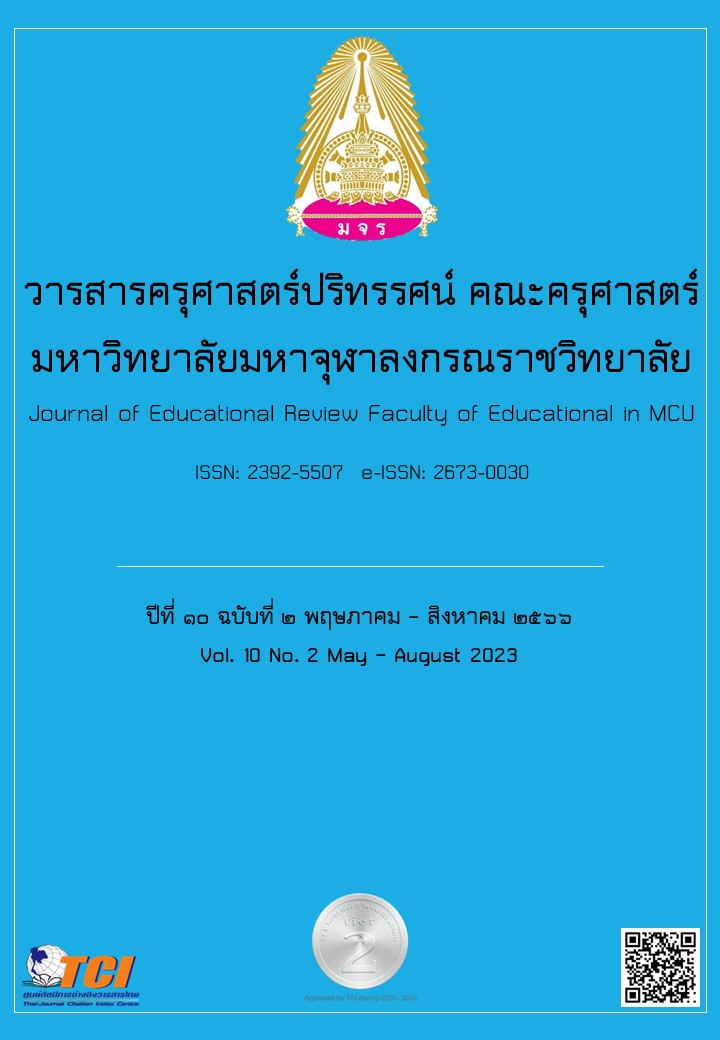A COMPARISON OF THE EFFECTS OF TRAINING COURSES PROMOTE CONSERVATION OF NATURAL RESOURCES AND THE ENVIRONMENT USING DISCUSSION AND BRAIN STORMING TECHNIQUES
Main Article Content
Abstract
The research aimed to 1) investigate the effectiveness of training programs promoting natural resource and environmental conservation using discussion and brainstorming techniques; 2) compare the outcomes of training programs using discussion and brainstorming techniques; and 3) assess the overall satisfaction with the training programs using discussion and brainstorming techniques. The sample group comprised 60 volunteer students from both junior-high-school and high-school levels who enrolled in the first semester of the academic year 2023. The participants were divided into two groups of 30 students each based on their prior knowledge and understanding of natural resource and environmental conservation. The first group received training using the discussion technique. The second group underwent training using the brainstorming technique. The research utilized two instruments: 1) training programs employing the discussion technique for the first group and the brainstorming technique for the second group; and 2) A pre-test and post-test consisting of 20 questions, distributed across four scenarios related to deforestation, smoke haze, forest encroachment for agriculture, and oil spill in the sea. The findings revealed that 1) the effectiveness of training programs after using the discussion technique was significantly higher than before (p < .05); 2) similarly, the effectiveness of training programs after using the brainstorming technique was also significantly higher than before (p < .05); 3) morover, the effectiveness of training programs after using both discussion and brainstorming techniques was significantly higher than before (p < .05); and 4) overall, participants expressed high satisfaction with the training programs using discussion and brainstorming techniques.
Article Details

This work is licensed under a Creative Commons Attribution-NonCommercial-NoDerivatives 4.0 International License.
ทัศนะและความคิดเห็นที่ปรากฏในบทความในวารสารฉบับนี้ถือเป็นความรับผิดชอบของผู้เขียนบทความนั้นเพียงผู้เดียว และไม่ถือเป็นทัศนะและความรับผิดชอบของกองบรรณาธิการ
กองบรรณาธิการขอสงวนสิทธิ์ในการคัดเลือกบทความลงตีพิมพ์และจะแจ้งให้เจ้าของบทความทราบหลังจากผู้ประเมินบทความตรวจอ่านบทความแล้ว
ต้นฉบับที่ได้รับการตีพิมพ์ในวารสารครุศาสตร์ปริทรรศน์ คณะครุศาสตร์ มหาวิทยาลัยมหาจุฬาลงกรณราชวิทยาลัย ถือเป็นกรรมสิทธิ์ของคณะครุศาสตร์ มหาวิทยาลัยมหาจุฬาลงกรณราชวิทยาลัย ห้ามนำข้อความทั้งหมดหรือบางส่วนไปพิมพ์ซ้ำ เว้นเสียแต่ว่าจะได้รับอนุญาตจากมหาวิทยาลัยฯ เป็นลายลักษณ์อักษร
References
กรมวิชาการ. (2546). พระราชบัญญัติการศึกษาแห่งชาติ พ.ศ. 2542 แก้ไขเพิ่มเติม (ฉบับที่ 2) พ.ศ. 2544 และ (ฉบับที่ 3) พ.ศ. 2553. กรุงเทพมหานคร: โรงพิมพ์อักษรไทย.
นิวัติ เรืองพานิช. (2556). การอนุรักษ์ทรัพยากรธรรมชาติและสิ่งแวดล้อม. พิมพ์ครั้งที่ 5. กรุงเทพมหานคร:
บุญเลิศ ตั้งจิตวัฒนา และเพ็ญศิริ ศรีคำภา. (2557). การพัฒนาการท่องเที่ยวแบบยั่งยืน. พิมพ์ครั้งที่ 2. นนทบุรี: ธรรมสาร.
บุญเลี้ยง ทุมทอง. (2553). การพัฒนาหลักสูตร. พิมพ์ครั้งที่ 2. กรุงเทพมหานคร: สำนักพิมพ์จุฬาลงกรณ์มหาวิทยาลัย.
สุวิทย์ มูลคำและอรทัย มูลคำ. (2551). วิธีการจัดการเรียนรู้ : เพื่อพัฒนาความรู้และทักษะ. พิมพ์ครั้งที่ 7.กรุงเทพมหานคร: โรงพิมพ์การพิมพ์.


